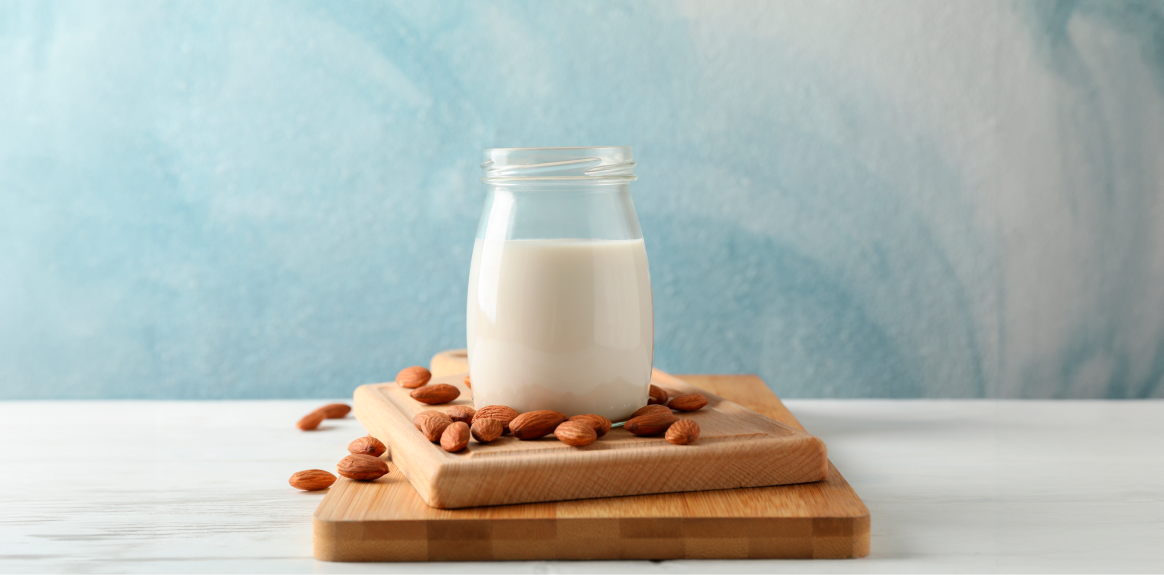Does almond milk break a fast? — Explained by Simple

Water, unsweetened tea, diet soda, and black coffee may be on our list of what you can drink while fasting, but what about other drinks, like plant-based milk? Does almond milk break a fast?
And does it matter what kind of almond milk or how much you have? Does unsweetened almond milk in coffee break a fast?
Here’s what you need to know about almond milk while fasting.
Will almond milk break a fast?

Does almond milk break intermittent fasting?
Technically, consuming anything with more than 10 calories during a fasting window will break a fast by raising your blood sugar and insulin levels. A serving of almond milk (and other dairy / non-dairy milks) contains more calories than that — so a serving of flavored, sweetened, or unsweetened almond milk will break a fast.
However, technicalities don’t necessarily dictate your fasting experience, and the answer to “Does almond milk break your fast?” can vary based on your fasting goals, your body, and how much almond milk you have.
Everyone’s fasting needs are different, and you may not need a strict calorie cut-off to see fasting benefits like weight loss and improved metabolic health. Plus, maybe you only want a splash in your coffee or tea.
Because it’s tricky to figure out “Can I drink almond milk while fasting?” — and if intermittent fasting is safe for you — we always recommend speaking with your healthcare provider before changing up your eating habits.
From general advice on what breaks a fast and what to eat during fasting to specific tips around intermittent fasting and insulin resistance or intermittent fasting and blood sugar, we can also help you gear up for your best fasting experience. Just take our Simple quiz to get started with a personalized action plan.
What is almond milk?
In spite of its name, almond milk doesn’t actually involve any milk. (Nope, there aren’t tiny machines milking almonds out there!)
Almond “milk” is made either by adding water to almond butter or soaking and grinding almonds in water before extracting the residual almond pulp.
Nutritional value
A standard serving of unsweetened almond milk (1 cup / 240 ml) contains about 40 calories. Specific amounts of nutrients can vary by brand, but on average, each serving has:
- 2.5–3 g of fat
- 1–1.5 g of protein
- less than 1 g of carbs (almond milks with added sugars / flavors will contain more)
A natural source of magnesium and vitamin E, almond milk is often fortified with other micronutrients, like calcium and vitamins A and D.
Health benefits and possible drawbacks of using almond milk while intermittent fasting

While there aren’t currently any studies investigating the benefits of intermittent fasting and almond milk specifically, almond milk is a low-calorie, low-fat, and cholesterol-free beverage rich in essential nutrients.[1] Almonds in their natural nut form have also been linked to benefits in weight loss / management, fat burning, blood pressure, immunity health, metabolic health, and gut health.[1]
Beyond potentially breaking your fast, drinking almond milk in moderation doesn’t create potential health drawbacks, either — as long as you don’t have a nut allergy! However, it’s always important to remember that fasting may not be for everyone, so check in with your healthcare provider before trying it. Especially if you’re pregnant, breastfeeding, or have any pre-existing health concerns, you want to run things by them before making any significant changes to your eating habits or lifestyle.
Tips on using almond milk during a fast
- Know your fasting parameters. Avoid playing a guessing game with questions like “Can I have almond milk while fasting?” by working with your doctor to figure out what safe, effective fasting looks like for you.
- Top up rather than fill up your glass. A small amount of almond milk (less than 1/4 of a cup) likely won’t break your fast and still brings the flavor.
- Drink almond milk during your eating windows. Skip worrying about how much almond milk breaks a fast by keeping this drink out of your fasting period altogether.
- Aim for unsweetened varieties. More calories and more sugar could spell more problems for your fast. Skip flavored and sweetened almond milks. If you make your own at home, limit even natural sweeteners like honey, dates, or maple syrup.

